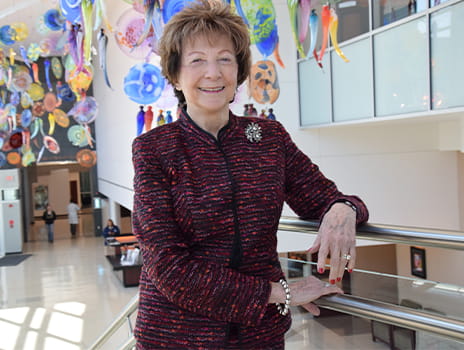When Surgery Wasn't an Option


November 07, 2018
Doris Bowman survives severe aortic stenosis thanks to the CoreValve treatment at The University of Kansas Health System in Kansas City
At 87, Doris Bowman feels great. She walks 30 minutes each day on a treadmill and enjoys the occasional outing to Oak Park Mall. But earlier this year, Bowman couldn't walk from the mall parking lot to the entrance without pain and discomfort.
"I was huffing and puffing, and my legs hurt so badly," Bowman recalls. "I couldn't walk far before having to sit down."
Bowman would soon learn that her symptoms were warning signs of an undiagnosed heart condition. But this was not the first time she experienced a problem with her heart. In 1991, she was diagnosed with a heart murmur. In 2010, she nearly lost her life to sudden cardiac arrest.
"My husband heard me fall. He came upstairs and immediately called 911. They couldn't find my pulse when they got here," Bowman says. "I was in a nearby hospital for a month and I was in a coma for 2 days. At one point, I didn't breathe for 40 minutes. They were ready to pull the plug, but then I opened my eyes."
Doctors implanted a pacemaker to restore a normal heartbeat. After she was discharged, Bowman attended cardiac rehab in Leawood, Kansas, and continued to see her regular cardiologist at The University of Kansas Health System to monitor her condition.
When Bowman began experiencing fatigue, pain and shortness of breath, she made an appointment at The University of Kansas Health System in Kansas City to have her heart checked. Tests revealed she had developed severe aortic stenosis – a heart disorder that occurs when the heart valve narrows, restricting blood flow to the body.
Treatment for severe aortic stenosis typically includes surgery to replace the unhealthy heart valve with a functioning valve. However, due to health concerns, Bowman was not a candidate for surgery. Her cardiologist, Martin Emert, MD, suggested she take part in a clinical trial. The study is part of a national clinical trial evaluating the safety and effectiveness of the Medtronic® CoreValve® System. CoreValve is a prosthetic heart valve for patients like Bowman who need aortic valve replacement but are considered inoperable. It can be implanted through a minor incision without the need for open-heart surgery.
Heart surgeon Trip Zorn, MD, and interventional cardiologist Peter Tadros, MD, performed the procedure. After her surgery, Bowman says she felt an immediate improvement in her condition.
"The next morning, I asked the nurse to let me walk to the end of the hall without sitting down, just to see how I felt," she says. "I wasn't huffing and puffing. I could walk the corridor. I couldn't get over how well I felt."
Bowman continues to stay active and healthy. She also continues to receive care from The University of Kansas Health System.
"This procedure was just phenomenal. I can't sing its praises enough," Bowman says. "Now all my doctors are at The University of Kansas Health System."
